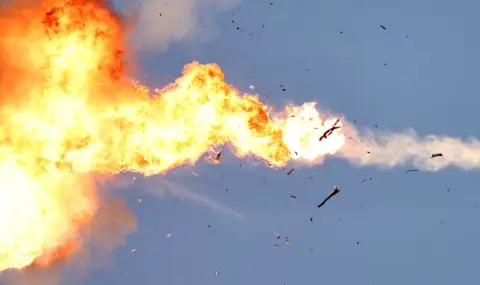Israel launched a wave of bombings across southern Lebanon this morning in what Israeli officials said military, a pre-emptive strike against the Shiite movement "Hezbollah". Against this background, the group announced that it had launched hundreds of rockets and drones against Israel in retaliation for last month's assassination of one of its top military commanders, the Associated Press reported, citing BTA.
The fierce exchange of blows has raised the threat of a full-scale conflict that could involve the United States, Iran and radical groups from across the Middle East region. It can also torpedo efforts to stop the fire in Gaza, where Israel has been fighting a war with the Palestinian group "Hamas", which is an ally of "Hezbollah", for more than ten months.
The Iranian-backed Lebanese Shiite group said it carried out the attacks on Arbain Day, during which Shiite Muslims mark the end of 40 days of mourning beginning with Ashura, marking the martyrdom of Imam Hussein ibn Ali.
br />
He is the grandson of the Islamic prophet Muhammad and the third Shiite imam.
First, the Israeli army announced that the movement "Hezbollah" intended to subject Israel to massive rocket fire. Shortly after, the Lebanese group announced that it had launched an attack on Israeli military positions as part of the first phase of its response to the July killing in an Israeli airstrike of its top military wing commander, Fouad Shukr, who was also one of the movement's founders.
The exchange of blows came as Egypt hosts a new round of talks to end the war between Israel and Hamas. Hezbollah has announced that it will cease fire against Israel if this happens in Gaza as well. Iran supports both groups, as well as other fighters in Syria, Iraq and Yemen, who could become involved in possible hostilities if the conflict escalates.
The entire territory of northern Israel was resounded by the wail of air raid sirens, and the international airport "Ben-Gurion" temporarily stopped serving flights. Israeli airport authorities said the airport resumed operations at 07:00 local time (04:00 GMT).
Lt. Col. Nadav Shoshani, an Israeli military spokesman, said the movement "Hezbollah" intended to attack targets in northern and central Israel. According to him, according to initial estimates, the shelling by the Lebanese group caused "very little damage" on Israeli territory, but added that the army remained on high alert. According to him, about 100 Israeli planes participated in today's Israeli strikes on the territory of Lebanon.
Lebanese National News Agency (NNA) reported that one person was killed when a car was hit in the city of Hiam. According to data from Lebanese media, there were strikes all over the territory of southern Lebanon, and footage purporting to be of them appeared on social networks.
The movement "Hezbollah" announced that it had fired over 320 Katyusha rockets; at multiple sites in Israel, as well as a "large number" drones. According to the group, the operation was aimed at hitting a specific "Israeli target to be announced later" as well as other enemy sites such as barracks and platforms of (the anti-missile defense system) "Iron Dome".
"Hezbollah" announced that the first phase of the group's response to Shukr's killing had ended, adding that today's operation would allow it to carry out more attacks even further into Israeli territory. According to the Lebanese Shiite movement, all the kamikaze drones it launched hit their targets, but did not specify how many were unmanned. 11 bases, barracks and military positions are listed, which according to "Hezbollah" were attacked in northern Israel and the Israeli-annexed Golan Heights.
Israeli Prime Minister Benjamin Netanyahu said his country would take all necessary measures to defend itself after the Lebanese Shiite movement "Hezbollah" fired hundreds of rockets and drones at Israel in response to the killing of a senior commander from the group, Reuters reported.
"We are determined to do everything we can to protect our country, so that the people of northern Israel can return safely to their homes, and to continue to apply the simple rule - if someone harms us, we will harm them too,'' he said. the prime minister.
Earlier, Israeli Defense Minister Yoav Galant declared a 48-hour state of emergency on the territory of Israel because of the massive shelling that Hezbollah subjected Israel to that night, the agencies recall.
In the US, White House National Security Council spokesman Sean Savet said President Joe Biden was "monitoring developments in Israel and Lebanon closely.
"On his orders, high-ranking American officials are in constant contact with their Israeli counterparts," Savet added. "We will continue to support Israel's right to self-defense and will continue to work for stability in the region."
The Pentagon announced that US Defense Secretary Lloyd Austin spoke by phone with his Israeli counterpart Yoav Galant. Austin has reaffirmed "the firm commitment of the United States to the defense of Israel against any attack by Iran and its regional partners and allies".
In recent weeks, foreign policy officials from the US and European countries have embarked on a wave of diplomatic shuttles to Israel and Lebanon to ease tensions over fears it could lead to a larger regional war.
Last week, the Israeli defense minister announced the transfer of additional troops to the Lebanese border in anticipation of fighting with "Hezbollah".
